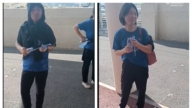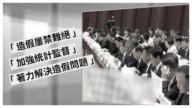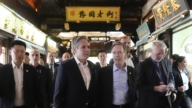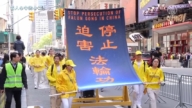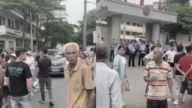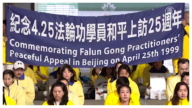【新唐人2011年2月16日訊】有人說,中國只有兩種人—-「體制內人」和「體制外人」。而眼下,爭相回到體制內,成為中國最時髦的命運轉機。那麼,體制內外到底有甚麽區別呢?讓我們來看看。
在中國,體制內和體制外是個含糊的說法,似乎是只可意會不可言傳。一般,體制內,就是當今的公務員和有行政職能的事業編製;體制外,就是前兩者之外的,如依託市場經濟體制的企業、純市場化運作的事業單位、個體、自由職業、無業者等等,以及廣大的農民,俗稱P民。
而體制內到底有多誘人?英國《金融時報》陶笸籮的文章《到“體制內”去!》說了一個最簡單的測試方法:就是去體制內的食堂大吃一頓。
去年12月12號深夜,南京市級機關事務管理局網站上的“每週菜譜”,被網友截圖,發佈在各大網站上後,引起數萬名網友圍觀。這120道菜譜最低5角,最高才2元5角,這個體制內食堂讓網友感歎:“太便宜了,太豐富了。”
而四川成都市錦江區機關事務管理局,從2010年1月4號起,早中晚飯實行的“一元就餐制”也被網友發帖曝光而引發熱議。
陶笸籮還談到,體制內的好處遠遠不止這點,GDP漲得越高,百姓稅負越重,當全中國百姓都水深火熱,被房價、物價抽筋扒皮的時候,只有體制內還可以安之若泰。
史學家蘇明教授指出,中共想盡了辦法從人民的口袋裏搜刮錢財,是為了維持這個政權的繼續存在,但是目地既不是為國,更不是為民,不過是為了「體制內」的一小撮既得利益的特權分子。
蘇明:「一位金融經濟學家,經過長時間的研究以後得出的一個數字,那就是共黨的幹部們每年桌子底下的黑色收入,竟然佔到了當年GDP的30%。就說共黨貪腐的錢佔二十六萬億的GDP的30%,那就是說接近八萬個億是進了共黨層層幹部們的腰包裡去了。」
例如,在中國,“經濟適用房”普通老百姓多花錢也別想買到,能享受的卻是「體制內」的人。
去年陝西山陽縣,被爆光“經濟適用房”申請者九成是公職人員後,今年1月13號,福建省上杭縣的“經濟適用房”申請名單引髮網民強烈關注,因為其中申購者87%是來自政府部門、事業單位的公職人員。
2009年,福布斯雜誌推出全球稅負痛苦指數排行榜,中國排名全球第二,排名第一的則是法國。兩者之間不同的是,法國民眾享受著優越的社會福利。而中國人稅收越來越重,卻有數億民眾只交稅,享受不到任何養老、醫療、失業保險、住房補貼、義務教育福利,因為,他們是「體制外」的人。
新唐人記者李靜、薛莉綜合報導。
Two Different Lives of Insiders and Outsiders of Chinese System
Some say that China only has two kinds of people,
“insiders of the system” and “outsiders of the system.”
Currently, rushing back into the system has become
the most fashionable turn for the better.
What』s the difference between insiders and outsiders?
Let’s take a look.
In China, “the system” is a vague description.
It can be understood, but not describable in words.
Generally speaking, “within the system” refers to
people in civil service and administrative agencies.
“Outside the system” means in other institutions,
such as firms based on market operations,
professionals, unemployed, and peasants,
known as the P people (the unworthy).
How attractive is it to be within the system?
Tao Poluo published an article in UK』s Financial Times,
“Go into the system, " in which he mentioned
a simple way to taste the benefit:
dine in the “cafeteria within the system.”
In Dec. 2010, netizens published on line a
“Weekly Menu" of Nanjing municipal agencies.
It attracted the attention of tens of thousands.
Of the 120 dishes, the cheapest was 50 cents;
the most expensive was only 2 yuan and 50 cents.
Netizens lamented: “So cheap and so many varieties."
A government agency in Chengdu, Sichuan Province
started to offer “1 dollar lunch/dinner” in Jan. 2010.
Online posts about this sparked heated debates.
Tao said there are other benefits within the system.
The higher the GDP rises, the heavier the tax burden.
When all Chinese are tormented by high housing
and merchandize prices,
people within the system are imperturbable.
Historian Su Ming said, the CCP tried all means
to squeeze people’s money from their pockets
for the survival of the regime.
It is not for the country or the people,
but for a small privileged group of vested interests.
Su: A financial economist got a number through
his calculation that the Party officials』 gray income
is equal to 30% of China』s annual GDP.
Out of the 26 trillion yuan of China』s annual GDP,
nearly 8,000 billion yuan is embezzled by the officials.
In China, “affordable housing" is out of the reach
of the ordinary people. It is enjoyed by “the insiders.”
In 2010, in Shanyang County in Shaanxi,
90% of applicants for affordable housing were found
to be civil servants. On Jan. 13, 2011,
the applicant list of “affordable housing"
in Shanghang County, Fujian, was posted online
and stirred up heated discussion,
as 87% were government employees.
In 2009, Forbes published Global Tax Misery Index.
China is ranked second, and the first was France.
However, the French enjoy a lot social benefits.
The Chinese only see increasingly heavy taxes.
Hundreds of millions of taxpayers are not entitled to
any welfare or social benefits,
because they are “outsiders of the system."
NTD reporters Li Jing and Xue Li



